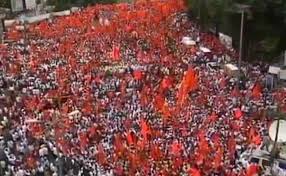This article has multiple issues. Please help improve it or discuss these issues on the talk page . (Learn how and when to remove these messages)
|
 | |
| Native name | मराठा क्रांती मोर्चा |
|---|---|
| Location | Worldwide |
| Also known as | मराठा क्रांती (मूक) मोर्चा |
| Organised by | Maratha Community |
The Maratha Kranti Morcha, loosely translated as "Maratha revolutionary march" in the Marathi language, was a series of silent and pragmatic protests organized by the Maratha community in various cities across India, and in overseas diaspora communities. Other groups, such as Muslims and other religious minorities, also supported the Morcha. [1] The impetus for the rallies was the rape and murder of a 15-year-old girl in Kopardi village, Maharashtra, on 13 July 2016. [2] The protesters demanded the death sentence for the rapists. The Maratha caste dominate the power and cultural structure in Maharashtra due to the size of their population. [3]
Contents
- 2016 demands
- Influencing factors
- Judicial
- Silent protests
- Hunger strike
- 2023
- 2025
- Rasta Roko Morcha
- 2025 2
- Gallery
- Violence
- January 2017
- July 2018
- August 2018
- Impacts
- General Election 2024
- Civic Elections Maharashtra 2025
- Dynamics of Conflict
- Antagonistic to Maratha Kranti Morcha
- Constitution of India: Part III Fundamental Rights
- Article 15: Clause 5
- See also
- Integration of India
- References
- External links
The rallies featured no leaders and no slogans. Millions of people from across Maharashtra came together to protest, and initially no harm was done to any public or private property until January 2017, when a few instances of violence were noted. [4]
The demand for Maratha reservations in educational positions and government jobs were also a part of these protests. At the time, the Bombay High Court had recently upheld the reservations granted to the Maratha community, but also mentioned that the percentage of quotas given wasn't justifiable. [5] Later, the Supreme Court quashed the Maratha community reservations. [6] A large percentage of Marathis are farmers, and the community had been severely affected by droughts and degraded arable land. Due to the lack of reservations, unemployment had become a major problem in the Maratha community. Some castes within the Maratha community, known as Kunbi, did receive the benefits of reservations provided to the Other Backward Class category; however, most people were alleged to have lost their benefits.




